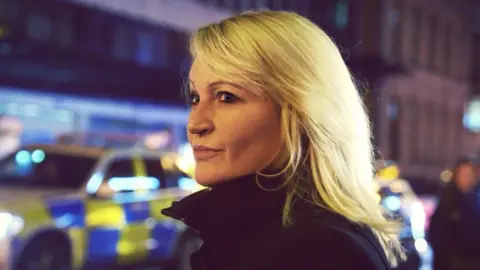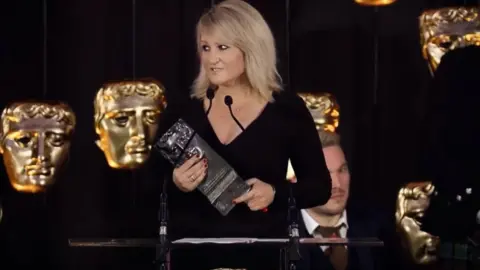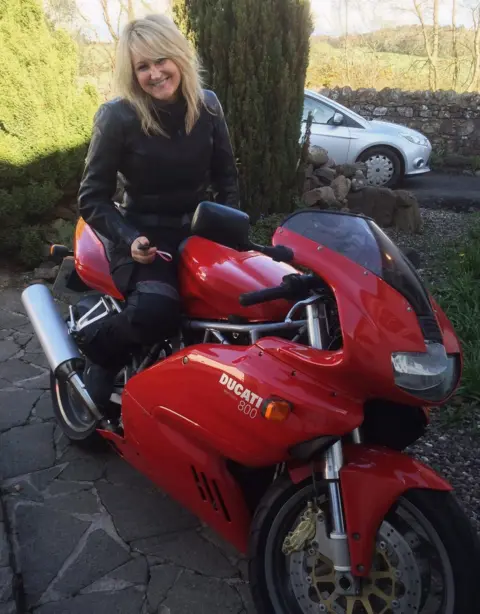BBC's Sam Poling kept endometriosis private to hide 'weakness'
 BBC
BBCFor much of her professional life, Sam Poling has spent time in the company of counterfeit cigarette gangs, cocaine traffickers and convicted murderers while undercover.
The BBC investigative journalist, 46, has remained calm in high pressure situations and has managed often exhaustive scrutiny over her work.
"Showing any sign of weakness is never going to work," she said.
This is partly why she never spoke publicly about living with a chronic condition which at times left her on her knees crying with pain.
Endometriosis affects one in 10 women in the UK - Sam has lived with hers since she was a girl, speaking about it only to close friends and family.
Now, as first reported in The Scottish Sun, she has shared her story publicly following in the footsteps of BBC colleague Fiona Stalker - a fellow sufferer who has raised awareness of the condition.
"Fiona was brave enough to talk - and I've spent my entire time begging people to talk to me in my job," Sam said.
"You spend so many years in pain and not being believed that you become numb."

What is endometriosis?
The condition means cells like the ones in the lining of the womb (uterus) are found elsewhere in the body.
Each month these cells react in the same way to those inside the womb - building up, then breaking down and bleeding, but with no way to escape.
Painful periods are just one of potential symptoms, which can also include pain during sex, heavy, prolonged or irregular periods, pain when passing urine, symptoms of irritable bowel, back and leg pain, fatigue, infertility and depression. Surgery can also cause adhesions - which are bands of scar tissue that can bind two organs together.
Because some symptoms are shared by other illnesses, diagnosis is very difficult. On average it takes more than seven years between a woman first seeing a doctor about their symptoms and receiving a firm diagnosis.
The cause is unknown and there is no definitive cure.

Sam is best known for investigations on BBC's Panorama and Disclosure - most recently her work on the documentary Who Killed Emma? won the Nations & Regions Current Affairs award at the annual RTS ceremony.
Many of her colleagues had no idea of the pain she experiences, not just during a period, but for three out of four weeks every month.
The condition first emerged when Sam was 12, but it was not diagnosed until she was 30.
She describes the feeling as "the worst pain you can imagine deep inside your body" - and has often walked around doubled up in pain.
Surgeons who could not find the cause through operations told her she was being "dramatic".

"When I was growing up I just thought being on your hands and knees crying on the floor every month was normal," she said.
"Whenever I went to the doctor or complained I was told I had a low pain threshold - that I was making it up to get off school or uni.
"This is the story for so many women, you're made out you're lying and that was it for a long time because takes so long to get a diagnosis."
'You silence yourself'
In an effort to manage her condition, Sam has had "countless" operations and been put through chemical menopause three times.
The procedure is unpleasant and causes almost immediate symptoms including hot flushes and memory loss.
Doctors have repeatedly recommended she receive a hysterectomy - which does not guarantee an end to pain.
She said: "Not being able to remember the day, who I'm interviewing or the questions I'm asking and having a constant battle with yourself because you don't want to say 'I'm struggling' - that's my problem.
"When you spend years being belittled, humiliated, embarrassed, ignored and dismissed by people who should have been helping you at the time, you learn to silence yourself."
 Sam Poling
Sam Poling
In the past Sam has been able to take comfort in the support of her closest colleagues.
She welcomes the news that BBC Scotland has now become an endometriosis-friendly employer.
The scheme - run by the charity Endometriosis UK - enables employers to better support women with the condition by educating staff, breaking stigmas and encouraging practical adjustments in working life.
A spokeswoman for Endometriosis UK said: "With female employment rates higher than ever before and endometriosis costing the UK economy £8.2bn a year in loss of work, treatment and healthcare costs, endometriosis is a condition that employers cannot afford to ignore."
Sharing conversations
The charity recently surveyed about 2,000 people in the UK on awareness - less than half the people asked in Scotland knew what endometriosis was.
MPs have launched an inquiry into women's experiences of endometriosis following recent BBC research where half of the 13,500 women questioned said they experienced suicidal thoughts - many also said they rely on highly addictive painkillers.
Now under the care of a "life changing" consultant, Sam hopes her story will help improve conditions for women who face endometriosis in the future.
She added: "Any conversation is a good conversation. I am delighted when I see and hear people talking about it and social media is a great thing for people to share these conversations.
"I think it was 18 months ago a young woman had made a video diary about life with endometriosis. It was just brilliant and I was so proud of her, yet so sad that I didn't have that at the beginning."
